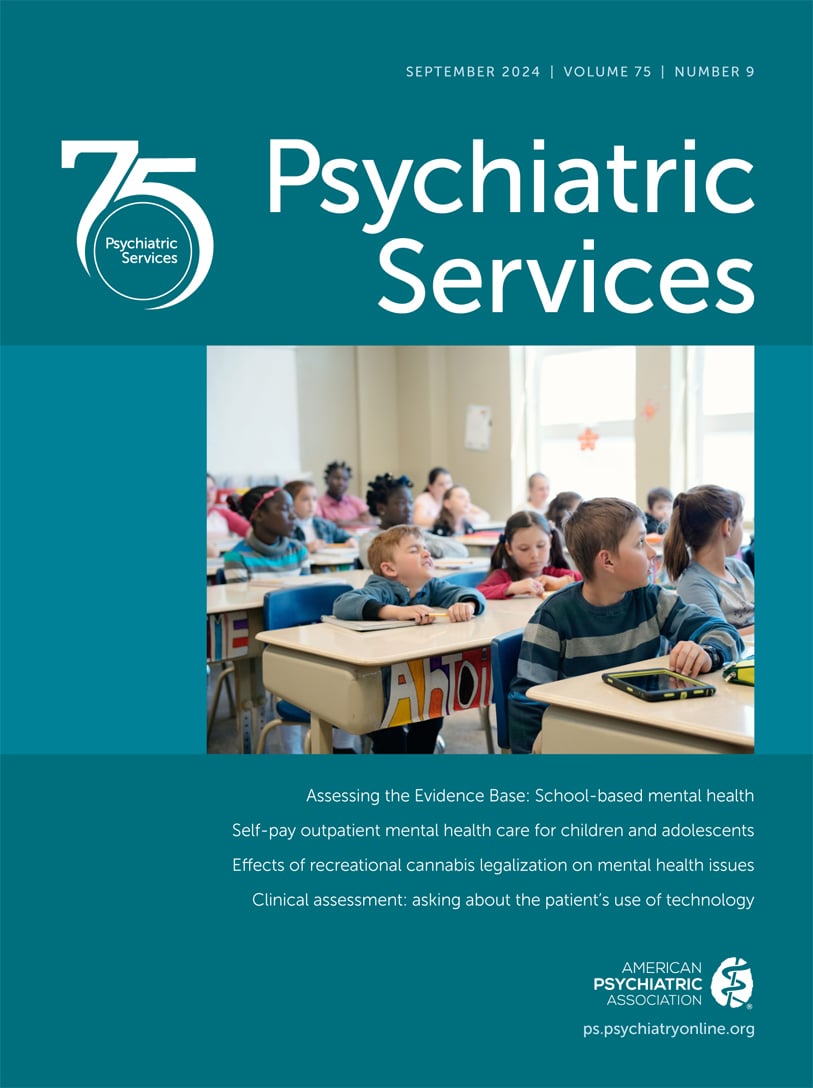Psychiatric Services
- Volume 72
- Number 8
- August 2021
Taking Issue
Articles
Publication date: 09 February 2021
Pages866–873Objective: Military service members and veterans have high rates of posttraumatic stress disorder (PTSD), as do military family members. Exposure-based, cognitive-behavioral approaches have received ample research, but other PTSD therapies require ...
https://doi.org/10.1176/appi.ps.202000355Publication date: 24 February 2021
Pages874–879Objective: Effective treatments for opioid use disorder exist, but rural areas of the United States have a shortage of services offering such treatments. Physician bias toward patients with opioid use disorder can also limit care access, but no studies ...
https://doi.org/10.1176/appi.ps.202000529Publication date: 18 December 2020
Pages880–884Housing is critical to enabling people with serious mental illnesses to live successfully in their communities. Yet unlike other essential community-based services, housing cannot be covered under the Medicaid program, which guarantees states federal ...
https://doi.org/10.1176/appi.ps.202000252Publication date: 17 May 2021
Pages885–890Objective: Preventing aggression and reducing restrictive practices in mental health units rely on routine, accurate risk assessment accompanied by appropriate and timely intervention. The authors studied the use of an electronic clinical decision ...
https://doi.org/10.1176/appi.ps.202000315Publication date: 17 May 2021
Pages891–897Objective: Stepped mental health care requires a rapid method for nonspecialists to detect illness. This study aimed to develop and validate a brief instrument, the Mental Wellness Tool (mwTool), for identification and classification. Methods: Cross-...
https://doi.org/10.1176/appi.ps.202000504Publication date: 04 May 2021
Pages898–904Objective: Addressing firearm access is recommended when patients are identified as being at risk of suicide. However, the practice of assessing firearm access is controversial, and no national guidelines exist to inform practice. This study ...
https://doi.org/10.1176/appi.ps.202000187Publication date: 07 May 2021
Pages905–911Objective: The authors assessed changes in health care coverage in nationally representative samples of low- and middle-income adults with and without substance use disorders following the 2014 Affordable Care Act marketplace launch and Medicaid ...
https://doi.org/10.1176/appi.ps.202000377Publication date: 23 April 2021
Pages912–919Objective: Longitudinal changes in health outcomes of patients with serious mental illness and co-occurring diabetes were examined after introduction of an intervention involving electronic disease management, care coordination, and personalized patient ...
https://doi.org/10.1176/appi.ps.202000096Publication date: 22 April 2021
Pages920–925Objective: Suicide rates continue to rise, necessitating the identification of risk factors. Obesity and suicide mortality rates have been examined, but associations among weight change, death by suicide, and depression among adults in the United States ...
https://doi.org/10.1176/appi.ps.202000475Publication date: 11 May 2021
Pages926–934Objective: High-deductible health plans (HDHPs) require substantial out-of-pocket spending for most services, although medications may be subject to traditional copayment arrangements. This study examined effects of HDHPs on medication out-of-pocket ...
https://doi.org/10.1176/appi.ps.202000362Special Articles
Publication date: 03 February 2021
Pages935–942Objective: Guidelines for treatment of opioid use disorder stipulate for mental health assessment and the option for treatment alongside medication for opioid use disorder (MOUD). Yet efforts to expand MOUD treatment capacity have focused on expanding ...
https://doi.org/10.1176/appi.ps.202000312Publication date: 07 May 2021
Pages943–950Multiple barriers exist to accessing behavioral health care, and several are related to payment. The national shortage of behavioral health providers is exacerbated by their not joining health insurance networks, often shifting the cost of treatment to ...
https://doi.org/10.1176/appi.ps.202000386Brief Reports
Publication date: 07 May 2021
Pages951–954Objective: Coordinated care models, such as the Medicaid health home, may be well positioned to identify and address addiction, yet little is known about the strategies health home plans use to identify and treat this condition. This study examined state ...
https://doi.org/10.1176/appi.ps.202000374Publication date: 08 July 2021
Pages955–959Objective: Caregivers play a key role in supporting the recovery of young adults with early psychosis. This role often involves considerable responsibilities and burden. Despite the considerable needs of caregivers, troubling service gaps addressing ...
https://doi.org/10.1176/appi.ps.202000193Commentaries
Open Forum
Publication date: 04 March 2021
Pages963–965Over the past decade, there has been a marked uptick in interest in increasing service user participation in the U.S. mental health care system, including clinical practice, research, and policy. Too often, however, these efforts remain superficial and ...
https://doi.org/10.1176/appi.ps.202000494Publication date: 27 January 2021
Pages966–968Eating disorder recovery has long been conceptualized as comprising the domains of weight, behaviors, and thoughts. Criteria for these domains are generally absolute (e.g., no specified behaviors in a set time frame) and determined by researchers and/or ...
https://doi.org/10.1176/appi.ps.202000447Publication date: 18 December 2020
Pages969–971The authors propose a new form of civil commitment that would benefit individuals with serious mental illness involved with the criminal justice system. This population has complex needs rooted in comorbid conditions, alienation from treatment and support ...
https://doi.org/10.1176/appi.ps.202000436Datapoints
Culture & Mental Health Services
Publication date: 17 May 2021
Pages974–977African American clergy provide informal counseling for community members with depression. Through a qualitative case study with two African American clergy and 25 community members in New York City, the authors explored perspectives on training clergy in ...
https://doi.org/10.1176/appi.ps.201900412Promoting High-Value Mental Health Care
Publication date: 30 April 2021
Pages978–981Access to inpatient psychiatric beds remains a significant barrier to care for patients having a mental health crisis. A quality improvement initiative described here was designed to increase access to care by increasing efficiency of health care delivery ...
https://doi.org/10.1176/appi.ps.202000379Past Issues
View Issues Archive
Vol. 75 | No. 12

Vol. 75 | No. 11

Vol. 75 | No. 10
